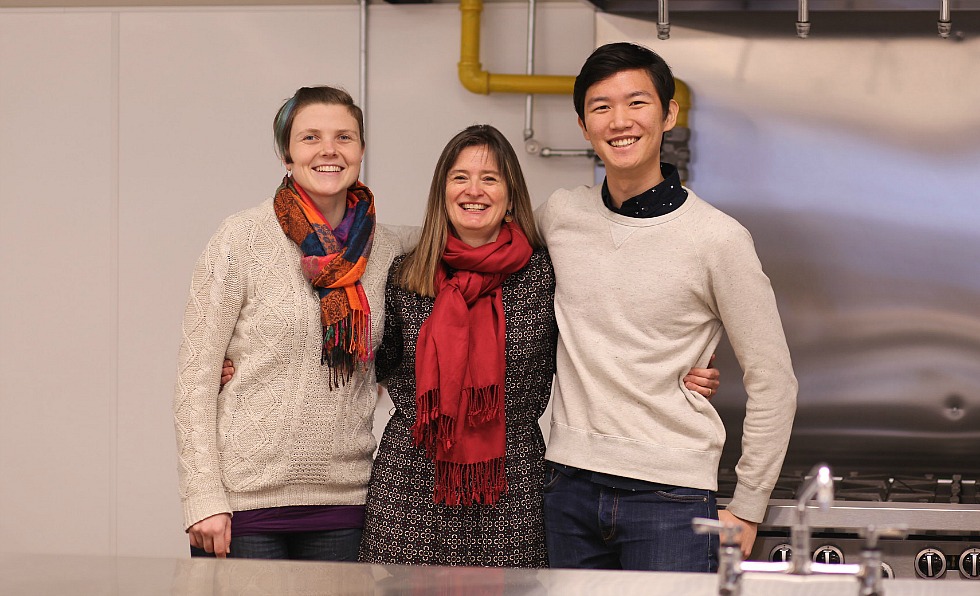McMaster research helping develop new programs for those struggling with food insecurity

Tina Moffat (centre), an associate professor in McMaster’s Anthropology Department and this year’s Scholar-in-Community, with Clare Wagner, the director of the Hamilton Community Food Centre and third-year Health Sciences student, Jun Park. Moffat is working in partnership with staff and community members at Neighbour 2 Neighbour’s Hamilton Community Food Centre to develop a framework to evaluate the Food Centre’s programs, and identify new ways to support those who either can’t afford – or don’t have access to – healthy food.
BY Erica Balch
March 23, 2017
McMaster researcher Tina Moffat is working with community partners on a research project aimed at finding ways to assess and improve programs designed to help those struggling with food insecurity, poverty and marginalization in Hamilton.
Moffat, an associate professor in McMaster’s Anthropology Department and this year’s Scholar-in-Community,* is working in partnership with staff and community members at Neighbour 2 Neighbour’s Hamilton Community Food Centre, which will open in April, to develop a framework to evaluate the Food Centre’s programs and identify new ways to support those those who either can’t afford, or don’t have access to healthy food.
“The Food Centre staff are really interested in listening to people who use the Centre and working with them in a grassroots way, but what they don’t have time for is systematic, formalized research – that’s something we can bring to the project,” says Moffat who co-created the project with Clare Wagner, the director of the Hamilton Community Food Centre, located in Hamilton’s Rolston neighbourhood on the West Mountain.
The Food Centre – a program of Neighbour 2 Neighbour developed in partnership with Community Food Centres Canada and the City of Hamilton – will provide access to high-quality food in a dignified setting that Moffat says is more like a restaurant than a soup kitchen. It will also offer a range of programs including community gardening, community cooking groups, an affordable produce market, and afterschool programming.
To develop ways of evaluating these programs, Moffat and third-year Health Sciences student, Jun Park, have spent the last several months interviewing Food Centre staff and conducting focus groups with potential users of the Centre.
“One very simple measure the Food Centre needs is how many people attend the Centre and how many new people are attending each of the programs,” says Moffat. “It sounds easy but remember, this is a vulnerable population – newcomers and people living on social assistance – people don’t always like to give you their information. So Jun and I have been asking them ‘how do you feel about a membership card? How much information are you willing to tell us? What kinds of questions do you feel comfortable answering?’”
Moffat says focus groups have also provided a unique opportunity to learn about the kinds of new programming that would be most helpful to potential users.
“There’s been lots of talk about programming for seniors and youth, for example, whereas in another neighbourhood it might be focused on another demographic,” she says. “This kind of input is important because Food Centre staff are really trying to develop programs that are tailored specifically to the Rolston neighbourhood.”
Moffat says that she and Park have already gathered valuable suggestions from potential Centre participants that could be implemented going forward including the idea of a member-advisory board to help shape future programming, as well as continuing to use focus groups as a way of engaging with Food Centre participants and doing program evaluation.
Going forward, Moffat says she hopes the project will form the basis of a larger study that will look at the impact of Food Centre programs on health outcomes.
“The Scholar-in-Community program has given me the chance to create a true research partnership with a community organization that’s doing ground breaking, innovative work through food and food sharing.” she says.
*The Scholar-in-Community program is administered by the Faculty of Social Sciences.


